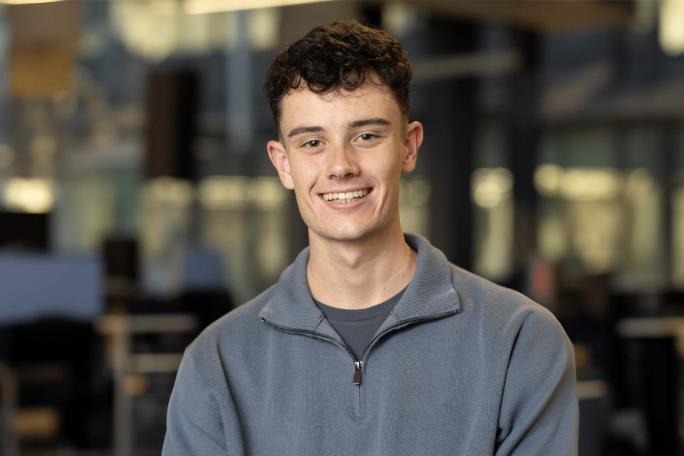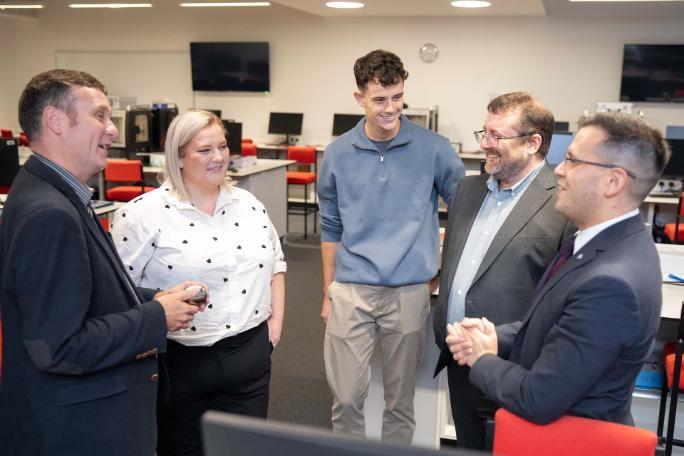Meet Ioan Hughes
PhD student in Nuclear Physics, Ioan Hughes, researches scenario-modelling approaches for decommissioning Pressurised Water Reactors. His work, in collaboration with Sizewell C, aims to develop risk and contingency models to make nuclear decommissioning safer, more predictable, and cost-effective.
Meet Ioan Hughes
- Name – Ioan Hughes
- Position – PhD Student
- Group Name – Nuclear Physics
- Joined University of Liverpool – 2020
- Born – Anglesey, North Wales
- Prior degrees – Master of Physics, University of Liverpool

What is your research about?
My research is part of a collaboration between the University of Liverpool and Sizewell C, aimed at Understanding and addressing the critical challenges involved in decommissioning Pressurised Water Reactors (PWRs).
Specifically, I’m developing scenario-modelling approaches to estimate the costs and risks associated with the decommissioning of Sizewell C. This involves analysing previous decommissioning efforts worldwide to understand what factors can impact time, quality, and cost, and how we can mitigate these from happening at Sizewell C.
By modelling a range of scenarios, my research aims to create a risk and contingency model that can provide Sizewell C with flexible, evidence-based strategies for managing decommissioning effectively and sustainably. My work is multidisciplinary, involving simulation tools and collaboration with industry experts, which is crucial for advancing practical, cost-effective solutions in nuclear decommissioning.
Ultimately, my research could help reduce the uncertainties in decommissioning planning, making it safer and more predictable – a key step for the future of nuclear energy management.
🚀 The other week, we signed a Memorandum of Understanding with @LivUni and @LpoolCityRegion. This collaboration will facilitate research and innovation across Britain, investing in the future of nuclear knowledge.
— Sizewell C (@sizewellc) November 18, 2024
Hear more from @MetroMayorSteve along with two PhD students,… pic.twitter.com/MRYcBNrq7B
What or who first inspired you to be interested in your research subject?
My interest in the nuclear industry began at a young age, inspired by my father, who worked as a nuclear engineer for 36 years at the Wylfa site on Anglesey. Visiting the site’s visitor centre with him sparked a fascination with nuclear science and a sense that I wanted to contribute to this field. This early exposure guided my academic path, prompting me to select as many nuclear-related modules as possible during my undergraduate studies.
For my master’s research at Liverpool, I developed a neural network for identifying multi-interaction gamma events in semiconductor detectors under the supervision of Dr Ellis Rintoul. This research was particularly rewarding, as it allowed me to apply my theoretical knowledge to a practical, industry-relevant problem. Completing this project solidified my desire to continue contributing to nuclear research, driving my decision to pursue a PhD directly connected to the nuclear industry through the EPSRC funded SATURN (Skills and Training Underpinning a Renascence in Nuclear) CDT.

What techniques and equipment do you use to conduct your research?
In my research on decommissioning Pressurised Water Reactors (PWRs) and spent fuel management, I rely heavily on scenario modelling techniques to estimate the associated costs and risks. This involves developing and analysing various decommissioning scenarios, informed by past data and lessons from previous PWR decommissioning projects worldwide. I use scientific computing software and specialised simulation packages to build and test these scenarios.
Additionally, I work with radiation simulation tools, particularly those that are integral to radiation detector development. These simulations allow me to model radiation levels and monitor radioactive decay over time, which is essential in planning safe, efficient decommissioning processes. Working closely with industry professionals, I have access to industry-grade radiation detectors and software, which provides hands-on experience with equipment directly relevant to real-world nuclear decommissioning and spent fuel management.
Which other subjects are important for your research?
Beyond physics, engineering is another key subject for my research. At undergraduate I took a mechanical engineering module, 'Nuclear Technologies', which was particularly valuable, as it provided essential insights and technical knowledge that I can draw upon throughout my PhD project.
What impact is your research have outside of academia?
My research will have significant real-world impact, particularly within the nuclear industry and on influencing wider public perception. By developing scenario-based models, I am contributing to to the creation of safer, more predictable, and cost-effective decommissioning processes. These improvements support the nuclear sector in planning long-term waste management strategies responsibly, reducing risks to both the public and the environment. As a result, my work can help improve public confidence in the nuclear industry by demonstrating a commitment to safe and sustainable practices, which is essential for the industry’s continued acceptance and growth in the UK and beyond.
What advice would you give to someone considering a career in research?
I didn’t realise I wanted to pursue a PhD until later in my undergraduate studies. However, after gaining hands-on experience tackling a real-world problem, I discovered just how rewarding it feels to make a tangible contribution to a field I’m passionate about. My advice is to choose an area that genuinely motivates you—one where you can see yourself making a difference and advancing the field. Passion and commitment are key, as research requires dedication, but working on something you truly care about makes the journey incredibly fulfilling.
By developing scenario-based models, I am contributing to to the creation of safer, more predictable, and cost-effective decommissioning processes.